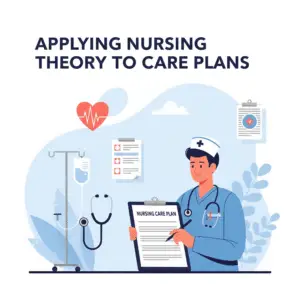 By Nurses Growth | Updated July 2025 | Nursing Education
By Nurses Growth | Updated July 2025 | Nursing Education
Nursing theories are not just academic concepts—they guide your clinical practice. Applying them correctly in a Nursing Care Plan (NCP) helps ensure quality, evidence-based patient care. Whether you’re a B.Sc. or M.Sc. Nursing student, this guide will show you how to connect theory to practice with confidence.
Why Apply Theory in Nursing Care Plans?
-
It gives a rational framework for decision-making
-
Promotes personalized and ethical care
-
Demonstrates professional competency in exams
-
Boosts your academic and clinical scores
Step 1: Understand the Patient Case
Begin with assessment:
-
Collect subjective and objective data
-
Identify key symptoms and patient history
-
Use this data to frame nursing diagnoses
Step 2: Choose a Relevant Nursing Theory
Some commonly used nursing theories:
-
Orem’s Self-Care Deficit Theory
-
Roy’s Adaptation Model
-
Peplau’s Interpersonal Relations Theory
-
Florence Nightingale’s Environmental Theory
Choose one that matches your patient’s needs. For example, if the patient struggles with independence, Orem’s theory may be most suitable.
Step 3: Apply the Theory to the NCP
Use theory principles in each step of the care plan:
-
Diagnosis: What does the theory say about this issue?
-
Planning: Set SMART goals based on theory concepts
-
Intervention: Choose nursing actions aligned with theory
-
Evaluation: Assess outcomes through the theoretical lens
Sample Example
If applying Roy’s Adaptation Model:
-
Diagnosis: Ineffective coping due to chronic illness
-
Goal: Enhance psychological adaptation in 3 days
-
Intervention: Support group referral, family counseling
-
Evaluation: Patient reports reduced anxiety (Adaptation achieved)
Final Tip for Students
When writing assignments or practical files:
-
Mention the theory name in your NCP
-
Highlight how it supports each care plan step
-
Use APA 7th style citations if required
Download Free Sample NCPs (Coming Soon)
We’re preparing downloadable nursing care plans with applied theories for common conditions. Follow Nurses Growth to access them soon.
